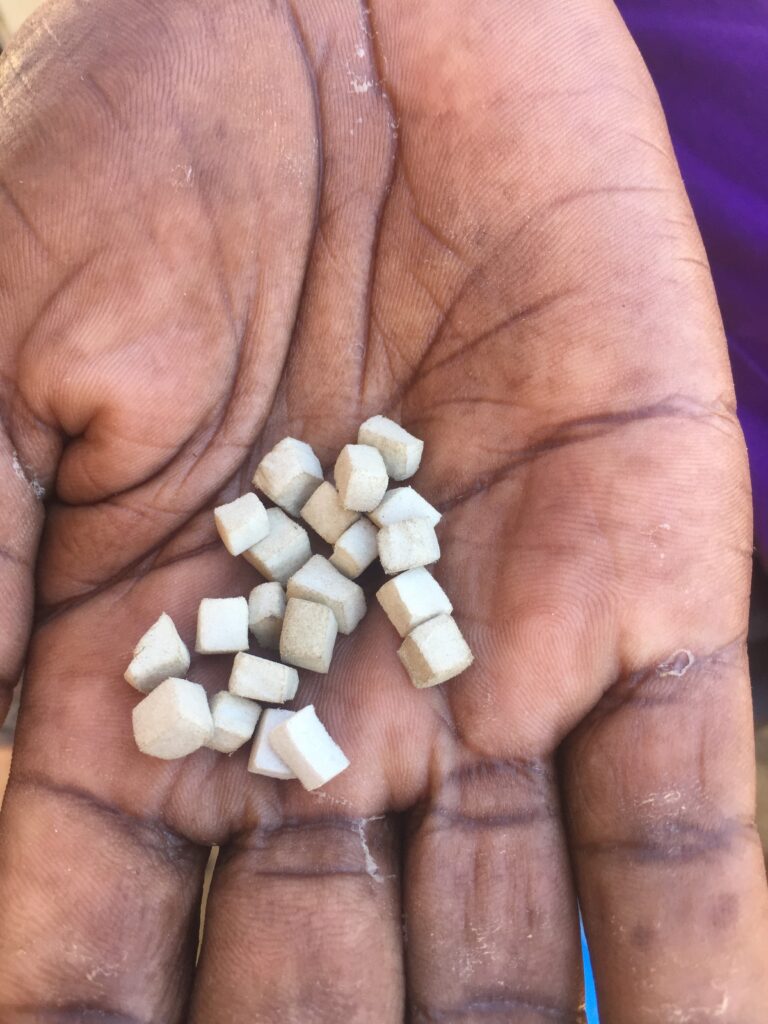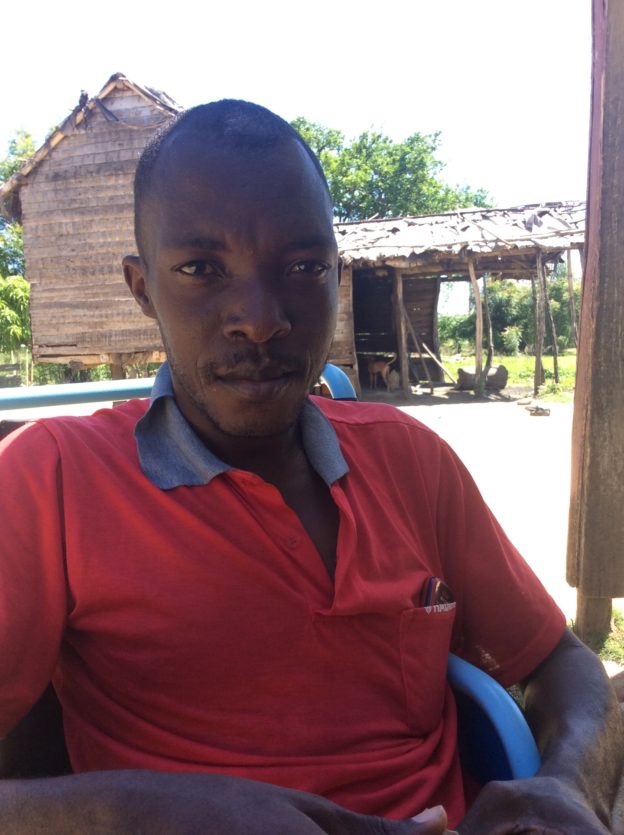Faustin Antoine lives just south of the main road that leads from downtown Tomond to the market in Kas, in a neighborhood of farmland called Wòch a Pyè. He joined the CLM program early in 2018 as a single father with a young son, Néhémie.
He had been living with his partner and their four children in the Dominican Republic, working mainly as a porter. A sudden illness robbed him of the use of his legs. He’s not paralyzed, but the effort to move either leg leaves it shaking uncontrollably, so he has great difficulty standing, much less walking. He returned to his parents’ home in Tomond with two of the children, but the daughter eventually went back to her mother.
When he first joined the CLM program, he was getting around as best as he could by leaning on one broken crutch and a walking stick. One of the program’s first efforts was to help him get to the office of Haiti’s Secretary of State for the Integration of Person’s with Disabilities. There he received a free wheelchair, a model designed for rough usage. He still doesn’t get around much because the yard he lives in is well off anything like a road, but at least he can move around the yard itself, which is made of hard, packed dirt.
As a CLM member, he chose goats and a pig as his enterprises, and he managed both successfully. He is not able to tend to them himself, but he has Néhémie, his parents, his siblings, and others to help him out. He just has to make sure he’s giving them the direction they need to stay on task. Like most members who only choose livestock, however, he was initially left without a way to earn steady income, even little bits of it. So he began selling cellphone minutes. His brother would make his wholesale purchases for him in downtown Tomond, and Faustin could sell to neighbors willing to come to him.
But selling cellphone minutes is not very profitable. The margin is small, and in a place like Wòch a Pyè the volume is small, too. Faustin planned to add a second business, selling cold drinks out of large cooler, but he would have to depend entirely on others to buy the drinks and the ice he would need. So he let a friend start the business instead. He lends the friend his cooler and the capital to buy merchandise, but the friend does the work and gives Faustin some of his profit.
Then during the fall, a couple of months after his graduation, Faustin had an idea. He would start selling rice. His brother buys two small sacks for him each week, and Faustin sells it by the cupful. A sack costs 1,875 gourds, which is a little over $20 right now. The sacks contain about 50 cups of rice, which go for 50 gourds each, so he should make 675 gourds on every sack.
But he actually makes much more than that because of the way he sells it. Some of his customers simply come to him and buy a cup of rice, but that’s not what most do. He has cut a piece of foam rubber into small cubes that he sells for five gourds. He also bought a deck of cards. His customers gamble for the little foam cubes. When they win ten of them, they can turn them in for a cup of rice. Or, if they want cash, they can sell the cup of rice back to him for 45 gourds. His strategy takes advantage of how much people like to gamble and it allows him, in a sense, to sell the same rice multiple times.

It’s been enormously successful. He started out with about 2750 gourds in the business, money he earned by selling one of his goats. After just about a month he has more than 20,000 gourds.
And he has plans to increase his income. He’s getting ready to move out of his mother’s house and into the one he built while he was in CLM. He already runs his card game/rice business there. But once he lives there, he’ll start selling rum, cigarettes, and snacks to the players. He can’t sell such things, especially rum, while living with his parents. “They’re church people. They don’t approve of that stuff.”

An out of the box thinker. Good for him.
There are no limits to creativity!
I think you should translate for the reader “Woch a Pye”. It’s classic!
Translating the name led to a discussion. It looks like Northern Creole, and would mean “Peter’s Rock.” Hébert pointed out the Peter’s Rock often refers to rocks containing enough flint that they are used to start fires. Gauthier was won over by Hébert’s hypothesis.